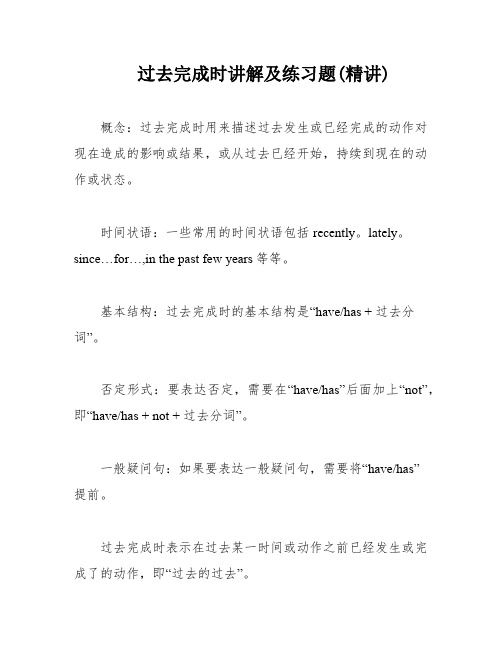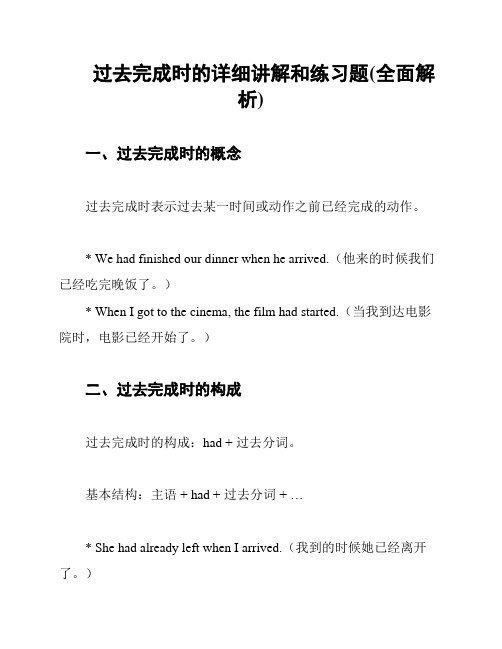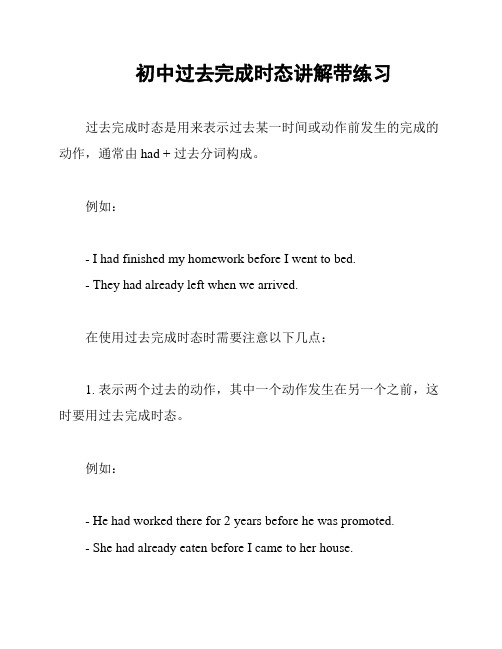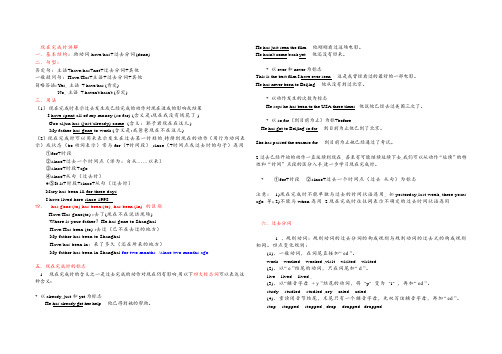过去完成时讲解及练习题
过去完成时讲解及练习题(精讲)

过去完成时讲解及练习题(精讲)概念:过去完成时用来描述过去发生或已经完成的动作对现在造成的影响或结果,或从过去已经开始,持续到现在的动作或状态。
时间状语:一些常用的时间状语包括recently。
lately。
since…for…,in the past few years等等。
基本结构:过去完成时的基本结构是“have/has + 过去分词”。
否定形式:要表达否定,需要在“have/has”后面加上“not”,即“have/has + not + 过去分词”。
一般疑问句:如果要表达一般疑问句,需要将“have/has”提前。
过去完成时表示在过去某一时间或动作之前已经发生或完成了的动作,即“过去的过去”。
构成:过去完成时由“助动词had + 过去分词”构成,其中had通用于各种人称。
例如:They had already had XXX(他们在到达酒店之前已经吃过早餐了。
)XXX 10:00 this morning.(今天早上10点前,她已经写完了作文。
)过去完成时的判断依据有两个:1.由时间状语来判定。
各种时态都有特定的时间状语。
与过去完成时连用的时间状语有:by + 过去的时间点,by the end of + 过去的时间点,before + 过去的时间点等等。
例如:I had finished reading the novel by nine o'clock last night.(昨晚9点前,我已经读完了这本小说。
)XXX English words by the end of last term.(上学期结束时,我们已经学了2000多个英语单词。
)They had XXX last XXX.(上XXX之前,他们已经种了600棵树。
)2.由“过去的过去”来判定。
过去完成时表示“过去的过去”,即过去某一动作之前已经发生或完成的动作,动作有先后关系,动作在前的用过去完成时,在后的用一般过去时。
初中英语语法过去完成时态讲解试题及答案

初中英语语法过去完成时态讲解试题及答案初中英语语法过去完成时经典练习题汇编一. 填入以下单词的正确形式。
1. It was warm,so I (take) off my coat.2. Jane (wait) for me when I (arrive).3. Sue wasnt hungry, so she (eat) anything.4. My brother came into the bedroom while I ????(dance).5. he (lie) on the ground at nine yesterday evening ?6. What Jim (write) when the teacher came in ?7. Mike and I (play) baskteball at that time yesterday afternoon.8. My brother (fall) while he (ride) his bicycle andhurt himself.9. I first met Lisa three years ago. She (work) at a radio shop at the time.10.When I arrived at his office , he on thephone.(speak)二.按要求进展句型转换。
1. We were having a PE class at four yesterday afternoon.(改为否认句)We a PE class at four yesterday afternoon.2. Kate was reviewing her lessons at eight last night.(改为一般疑问句,做肯,否答复,对划线局部提问)3. He ran in the park .(用at this time yesterday改写)。
过去完成时的详细讲解和练习题(全面解析)

过去完成时的详细讲解和练习题(全面解析)一、过去完成时的概念过去完成时表示过去某一时间或动作之前已经完成的动作。
* We had finished our dinner when he arrived.(他来的时候我们已经吃完晚饭了。
)* When I got to the cinema, the film had started.(当我到达电影院时,电影已经开始了。
)二、过去完成时的构成过去完成时的构成:had + 过去分词。
基本结构:主语 + had + 过去分词+ …* She had already left when I arrived.(我到的时候她已经离开了。
)* I had finished my work before he called.(他打电话之前我已经完成了我的工作。
)三、过去完成时的用法1. 表示过去某个时间点之前已经完成的动作。
* They had gone out before I arrived.(我到之前他们就已经离开了。
)* She had read the book before she went to bed.(她在睡觉前已经读过那本书了。
)2. 表示过去的过去,即在过去某个时间或动作之前已经完成的动作。
常和过去时连用。
* He said that he had visited the museum before.(他说他以前去过博物馆。
)* She had finished her homework when her mother came back.(当她妈妈回来时,她已经完成了作业。
)四、过去完成时的练题1. __________(you, finish) your homework before you went to bed last night?2. By the time we arrived, the party __________(start) .3. I __________(not, see) the movie before last night.4. Before I came to China, I __________(study) Chinese for three years.5. They __________(already, leave) when I got to the station.【答案】1. Had you finished your homework before you went to bed last night?2. By the time we arrived, the party had started.3. I had not seen the movie before last night.4. Before I came to China, I had studied Chinese for three years.5. They had already left when I got to the station.。
过去完成时态讲解及练习

完毕时态1)过去完毕时态的构成:必定式:had +动词的过去分词否认式:hadn't + 动词的过去分词疑问式:Had … + 动词的过去分词简略回答: Yes, 主+ have/has had.No, 主+ had 现在完毕时的使用方法2)过去完毕时合用场合1.过去完毕时表达在过去某一时间或动作以前已经完毕了的动作。
这个过去的时间惯用by,before 等介词短语或一种时间状语从句表达,也能够暗含在上下文中。
I had finished my homework before supper.我在晚饭前就把作业做完了。
The play had already started when we got to the theatre. 我们到剧场时戏已经开始了。
By the end of June they had treated over 10,000 patients. 到六月底他们已经治疗了一万多病人。
2.过去完毕时还可表达过去某一时刻之前发生的动作或状态持续到过去某个时间或还要持续下去,常与for,since 等词连用。
如:He had served in the army for ten years before he retired last year. 他在部队干了十年,去年退役了。
He told me that he had known her since he was a child. 他告诉我他从小就认识她。
He had learned English for eight years before he went to England for further study. 他在去英国深造前,已学了八年英语。
3.在一段情景连贯的文字中,先发生的事放在背面叙述时,要用过去完毕时。
如:Tom flew home, but his father had already died. 汤姆乘飞机回家,他的父亲却已经逝世了。
初中过去完成时态讲解带练习

初中过去完成时态讲解带练习过去完成时态是用来表示过去某一时间或动作前发生的完成的动作,通常由had + 过去分词构成。
例如:- I had finished my homework before I went to bed.- They had already left when we arrived.在使用过去完成时态时需要注意以下几点:1. 表示两个过去的动作,其中一个动作发生在另一个之前,这时要用过去完成时态。
例如:- He had worked there for 2 years before he was promoted.- She had already eaten before I came to her house.2. 句子中需要明确表示一个动作发生在另一个动作之前,可以使用过去完成时态。
例如:- When I got home, my mother had already cooked dinner.- By the time we arrived at the cinema, the movie had already started.3. 注意过去完成时态的时间范围,它仅限于过去发生的动作,而不包括现在的动作。
例如:- I have been to Japan before. (不可用过去完成时态)以下是一些练,请用过去完成时态填空:1. By the time I ______ (arrive) at the party, everyone had left.2. She _______ (not finish) her work, so she had to stay late.3. When he __________ (arrive) at the station, the train had already left.4. They _________ (cook) dinner before their guests arrived.5. We _______ (already watch) that movie before.答案:1. arrived2. had not finished3. arrived4. had cooked5. had already watched。
现在、过去完成时、过去将来完成讲解及练习

现在完成时讲解一.基本结构:助动词have/has+过去分词(done)二.句型:否定句:主语+have/has+not+过去分词+其他.一般疑问句:Have/Has+主语+过去分词+其他.简略答语: Yes, 主语+ have/has.(肯定)No, 主语+ haven't/hasn't.(否定)三.用法(1)现在完成时表示过去发生或已经完成的动作对现在造成的影响或结果I have spent all of my money (so far).(含义是:现在我没有钱花了.)Guo zijun has (just/already) come. (含义:郭子君现在在这儿)My father has gone to work.(含义是:我爸爸现在不在这儿)(2)现在完成时可以用来表示发生在过去某一时刻的,持续到现在的动作(用行为动词表示)或状态(be动词表示)常与for(+时间段),since(+时间点或过去时的句子)连用.①for+时段②since+过去一个时间点(译为:自从……以来)③since+时段+ago④since+从句(过去时)●⑤It is+时段+since+从句(过去时)Mary has been ill for three days.I have lived here since 1998.四.has gone (to),has been (to), has been (in) 的区别Have/Has gone(to) :去了(现在不在说话现场)Where is your father?He has gone to Shanghai.Have/Has been (to) :去过(已不在去过的地方)My father has been to Shanghai.Have/has been in:呆了多久(还在所呆的地方)My father has been in Shanghai for two months. /since two months ago.五.现在完成时的标志1.现在完成时的含义之一是过去完成的动作对现在仍有影响,用以下四大标志词可以表达这种含义:* 以already, just和yet为标志He has already got her help.他已得到她的帮助。
过去完成时讲解及练习
一. 过去完成时的概念与结构概念:表示在过去某一时间或动作之前已经发生或完成了的动作,即“过去的过去(past-in-the-past )”。
构成:“助动词had + 过去分词”,其中had 通用于各种人称。
They had already had breakfast before they arrived at the hotel.在到达旅馆之前,他们已经吃过了早饭。
She had finished writing the composition by 10:00 this morning.今天早晨10点之前,她已经写完了作文。
二. 过去完成时的用法用法1. 表示一个动作或状态在过去某一时间或动作之前已经完成或结束,即发生在“过去的过去”。
例如:When I woke up, it had stopped raining.我醒来时,雨已经停了。
(雨停发生在醒来之前,即“过去的过去”)用法2. 表示某一动作或状态在过去某时之前已经开始,一直延续到这一过去时间,而且动作尚未结束,仍然有继续下去的可能。
例如:By the end of last year, he had worked in the factory for twenty years.到去年年底为止,他已经在这个工厂工作了20年。
(到去年年底为止已工作了20 年,还有继续进行下去的可能)三. 过去完成时的判断依据1. 由时间状语来判定一般说来,各种时态都有特定的时间状语。
与过去完成时连用的时间状语有:(1)by + 过去的时间点,例如:I had finished reading the novel by nine o'clock last night.到昨天晚上九点钟为止,我已经读完了这本小说。
(2)by the end of + 过去的时间点,例如:We had learned over two thousand English words by the end of last term.到上学期末为止,我们已经学了两千多单词。
过去完成时(详细讲解)
过去完成时一.定义过去完成时表示在过去某一时间或动作之前,已经发生的动作或存在的状态,也可说是“过去的过去”。
是一个相对的时态,只有在和过去某个时间或动作相比较时才会用到。
常与by,before等引导的时间连用,也可以用一个表示过去的动作来表示。
二、构成:have/has+v-ed三、用法1.过去完成时表示在过去某时或某个动作之前发生的动作或存在的状态或表示经历或经验.I said mother had been angry about your laziness since we moved here.The film had begun before we got to the cinema.2.过去完成时表示过去某一时间以前开始一直延续到那个时间并可能延续下去的动作。
常和by 或since, for引导的表时间的从句或短语连用,但必须要与一个表示过去时的动作相对照.He had worked in that school for three years before he came to our school.The film had already been on for half an hour when Millie got to the cinema.We hadn’t seen each other since he left Nanjing.3.过去完成时表示在某一动作之前已经完成的动作. 过去的时间由before, after, when引导的时间从句表示出来.I had finished cooking dinner before you came back.The class had begun when I got to schoolHe had left before I got home.4.在told, said, knew, heard, thought等动词引导的宾语从句中,一般用过去完成时。
高中英语时态语态专题-----过去完成时讲解和练习
过去完成时一、概念:过去完成时表示在过去某一时间或动作之前已经发生或完成了的动作,即"过去的过去( past-in-the-past )"。
----|-------------------------- |-------------------------------|---------------------------->那时以前那时现在二、基本结构:have/has + doneThey had already had breakfast before they arrived at the hotel.She had finished writing the composition by 10 :00 this morning.三、时间状语:recently, lately, since…for…,in the past few years, etc.四、过去完成时的判断依据1. 由时间状语来判定一般说来,各种时态都有特定的时间状语。
与过去完成时连用的时间状语有:( 1 )by + 过去的时间点。
如:I had finished reading the novel by nine o'clock last night.( 2 )by the end of + 过去的时间点。
如:We had learned over two thousand English words by the end of last term.( 3 )before + 过去的时间点。
如:They had planted six hundred trees before last Wednesday.2. 由"过去的过去"来判定。
过去完成时表示"过去的过去",是指过去某一动作之前已经发生或完成的动作,即动作有先后关系,动作在前的用过去完成时,在后的用一般过去时。
过去完成时讲解及练习
过去完成时讲解及练习什么是过去完成时?过去完成时是英语中的一种时态,用于表示过去某个时间点或事件之前已经发生的动作或状态。
它通常由动词had加上过去分词构成。
过去完成时常与过去简单时态或过去进行时态连用,以指明两个过去事件中的先后关系。
过去完成时的用法1. 表示过去某一时间点或事件之前已经完成的动作。
例如:- By the time I arrived, he had already left.(我到达时,他已经离开了。
)- We had finished dinner before the movie started.(电影开始之前,我们已经吃过晚饭了。
)2. 表示过去某一时间段内的连续或持续动作。
例如:- She had been studying English for three years before she moved to the United States.(她在搬到美国之前已经研究英语三年了。
)3. 表示过去某一时间点或事件之前曾经存在的状态。
例如:- When I arrived, they had already finished their homework.(我到达时,他们已经完成了他们的家庭作业。
)过去完成时的练练一将以下句子改写为过去完成时。
1. He started learning Spanish last year.- Answer: He had started learning Spanish last year.2. They had seen the movie before it was released.- Answer: They had seen the movie before it had been released.3. She finished her work and then she went home.- Answer: She had finished her work and then she went home.练二选择正确的动词形式填空,使用过去完成时。
- 1、下载文档前请自行甄别文档内容的完整性,平台不提供额外的编辑、内容补充、找答案等附加服务。
- 2、"仅部分预览"的文档,不可在线预览部分如存在完整性等问题,可反馈申请退款(可完整预览的文档不适用该条件!)。
- 3、如文档侵犯您的权益,请联系客服反馈,我们会尽快为您处理(人工客服工作时间:9:00-18:30)。
过去完成时1•概念:过去发生或已经完成的动作对现在造成的影响或结果,或从过去已经开始,持续到现在的动作或状态。
2•时间状语:recently, lately, since …for …,in the past few years, etc.3. 基本结构:have/has + done4. 否定形式:have/has + not +do ne.5. —般疑问句:have或has提前概念:过去完成时表示在过去某一时间或动作之前已经发生或完成了的动作,即"过去的过去(past-in-the-past )"。
—I -------------------------- | ------------------------------ 1 -------------------------- >那时以前那时现在构成:过去完成时由”助动词had +过去分词”构成,其中had通用于各种人称。
They had already had breakfast before they arrived at the hotel.She had finished writing the composition by 10 : 00 this morning.二、过去完成时的判断依据1. 由时间状语来判定一般说来,各种时态都有特定的时间状语。
与过去完成时连用的时间状语有:(1 ) by +过去的时间点。
女口:I had fini shed readi ng the no vel by nine o'clock last ni ght.(2 ) by the end of +过去的时间点。
女口:We had lear ned over two thousa nd En glish words by the end of last term.(3 ) before +过去的时间点。
女口:They had pla nted six hun dred trees before last Wedn esday.2. 由"过去的过去”来判定。
过去完成时表示"过去的过去”,是指过去某一动作之前已经发生或完成的动作,即动作有先后关系,动作在前的用过去完成时,在后的用一般过去时。
这种用法常出现在:(1 )宾语从句中当宾语从句的主句为一般过去时,且从句的动作先于主句的动作时,从句要用过去完成时。
在told, said, knew, heard, thought等动词后的宾语从句。
如:She said that she had see n the film before.(2 )状语从句中在时间、条件、原因、方式等状语从句中,主、从句的动作发生有先后关系,动作在前的,要用过去完成时,动作在后的要用一般过去时。
如:When I got to the statio n, the train had already left.After he had fini shed his homework, he went to bed.注意:before, after引导的时间状语从句中,由于before和after本身已表达了动作的先后关系,若主、从句表示的动作紧密相连,则主、从句都用一般过去时。
如:Where did you study before you came here?After he closed the door, he left the classroom.三、过去完成时的主要用法1. 过去完成时表示一个动作或状态在过去某一时间或动作之前已经完成或结束,即发生在"过去的过去"。
如:When I woke up, it had stopped raining.我醒来时,雨已经停了。
(主句的动作发生在”过去的过去")2. 过去完成时是一个相对的时态,表示的是"过去的过去”,只有和过去某一时间或某一动作相比较时才使用它。
如:He told me that he had written a new book. (had written 发生在told 之前)3. 过去完成时需要与一个表示过去的时间状语连用,它不能离开过去时间而独立存在。
此时多与already ,yet ,still ,just ,before ,never 等时间副词及by ,before ,until等引导的短语或从句连用。
女口:Before she came to China, Grace had taught English in a middle school for about five years. Peter had collected more tha n 300 Chin ese stamps by the time he was ten.4. 过去完成时表示某一动作或状态在过去某时之前已经开始,一直延续到这一过去时间,而且动作尚未结束,仍然有继续下去的可能。
女口:By theend of last year, he had worked in the factory for twenty years.(hadworked已有了20年,还有继续进行下去的可能)四、过去完成时与现在完成时的区别现在完成时表示的动作发生在过去,但侧重对现在产生的结果或造成的影响,与现在有关,其结构为”助动词have (has) +过去分词”;过去完成时则是一个相对的时态,它所表示的动作不仅发生在过去,更强调”过去的过去”,只有和过去某时或某动作相比较时,才用到它。
试比较:I have lear ned 1000 En glish words so far.到目前为止我已经学会了1000个英语单词。
I had learned 1000 En glish words till the n.到那时为止我已经学会了1000个英语单词。
-I'm sorry to keep you wait ing. 对不起,让你久等了。
-Oh, not at all. I have bee n here only a few minu tes.没什么,我只等了几分钟。
("等"的动作从过去某一时间点持续到现在)-Joh n returned home yesterday.约翰昨天回至U家的。
-Where had he bee n?他去哪儿了?(答语中使用过去完成时是指约翰在returned home之前去了哪些地方,即"过去的过去")五、过去完成时与一般过去时的区别虽然这两种时态都表示过去发生的动作或存在的状态,但在使用时应注意以下几点:1. 时间状语不同:过去完成时在时间上强调"过去的过去”;而一般过去时只强调过去某一特定的时间。
试比较:They had arrived at the stati on by ten yesterday.They arrived at the statio n at ten yesterday.2. 在没有明确的过去时间状语作标志时,谓语动词动作发生的时间先后须依据上下文来判断:先发生的用过去完成时,后发生的则用一般过去时。
如:She was very happy. Her whole family were pleased with her, too. She had just won thefirst in the compositi on competiti on.3. 当两个或两个以上接连发生的动作用and或but连接时,按时间顺序,只需用一般过去时来代替过去完成时;另外,在before , after , as soon as引导的从句中,由于这些连词本身已经表示出时间的先后,因此也可以用过去时来代替过去完成时。
如:He en tered the room, tur ned on the light and read an evening paperI (had) called her before I left the office.过去完成时可表示过去未曾实现的想法和打算,mean, expect, intend, suppose 等:I had meant to come, but something happened. 我本想来,但有事就没有来。
I had inten ded to speak, but time did n ot permit.我本想发言,但时间不允许。
We had hoped that you would come to see us, but you did n 我们本想你来看我们的,但你没有来。
过去完成时练习题1. 单项选择1. He asked me _____ during the summer holidays.A. where I had bee nB. where I had goneC. where had I bee nD. where had I gone2. What ___ Jane ___ by the time he was sever?A. did, doB. has, done C did, did.3. I _____ 900 English words by the time I was ten 。
A. learnedB. was lear ningC. had lear ned4. She ____ lived here for ______ y ears.A. had, a fewB. has, severalC. had, a lot of5. By the time my pare nts reached home yesterday, I ____ t he dinner already.6. She said she _________ the prin ciple alreadyA .has see n B. saw C. will see7. She said her family ______ t hemselves ______ t he army duri ng the war.A. has hidde n, fromB. had hidde n, fromC. has hidde n, withD. had hidde n, with8. By the time he was ten years old, he ________ .A. has completed uni versityB. has completed the uni versityB. had completed an uni versity D. had completed uni versity9. She had writte n a nu mber of books ____ the end of last year.A. forB. inC. byD. at10. He ____ to play ____ before he was 11 years old.A had lear ned, pia no B. had lear ned, the pia noC. has lear ned, the pia noD. lear ns ,pia no.11. What ______ Annie _____ b y the time he was ten?A. did, doB. did, didC. has, doneD. had done12 .He __ in the factory for three years before he joined the Army.A. has workedB. worksC. had workedD. will work13. By the end of last week, they __A. has completedB. completed14. Ben hates play ing ____ violi n,A. a …theB. the …the15. By the time he was 4, he ______A. had lear nedB. has lear ned the bridge.C. will completeD. hadcompletedbut he likes play ing football.C. / …theD. the …/a lot of Germa n words.C. lear nedD. lear ns通常连用的动词是want, think, hope, plan,D.had, doneD. learntD. has, a great deal ofA had cooked B. cooked C. have cooked D. was cookedD. had see n16 .Jim turned off the lights and the n ___ the classroom. A. was left B. had left C. has left D. left 17. They _______ in Gua ngzhou since 2000. A. lived B. had lived C. have lived 18. The train from Beijing _____ ten mi nu tes ago. A. has arrivedB. was arrivi ngC. arrivedtheir classroom whe n the visitors arrived. A . have clea ned B. had clea ned C. was clea ned 20. Fergie ______ the project in one hour. A. have fini shed B. will finish C. fini shes 21. The man ______ his coat and went out. A. put on B. had put on C. will put on 22 My mother ____ in that factory atthe age of 18.A. had workedB. has workedC.worked23. Dad ________ while he ______TV . A .fell asleep…watchB. was falli ng asleep …watchedC. fell asleep ......... w as watch ingD. had falle n asleep …watched2. 用动词的适当形式填空1. We____________ (pai nt) the house before we _____________ (move) in.2. That rich old man ____________(make) a will before he _____________ (die).3. They ____________ (study) the map of the country before they ________ (leave).4. The robbers____________ (run away ) before the policeme n ______ (arrive).5. I _________ (tur n off) all the lights before I ___________ (go) to bed.6. Paul _________ (go) out with Jane after he __________ (make) a phone call.7. Tom _________ (say) he __________ (read) the book twice.8. Our pla n ___________ (fail ) because we ____________ (make) a bad mistake. 9. When the chairma n ____________ (fini sh) speak ing, he ____________ (leave)the hall. 10. The Reads _______ (have) lunch whe n I _________________ (get) to their house.11. Whe n I ___________ (arrive) at the stati on, he ___________________ (leave). 12..We _______________ (learn) about 4000 En glish words by the end of last term. 13. I waited un til he _____________ (fini sh) his homework. 14. We were surprised at what she _______ already _____ (do)15.She ___________ (not go) to Qin gdao because she _______________ (go) there before. 16. He _____________ (not tell) you the n ews yet.17. He said he ____________ already ________ (give) the book to the teacher. 18. I _____________ (be) to Shan ghai before.19. She told me she ________________ (be) to Sanya three times.20.She _____________ (play) the guitar while her sister ______________ (sin g).D. were livi ng D. had arrived 19. The stude nts D. have bee n clea nedD. has fini shed D. was putt ing on D. works。
